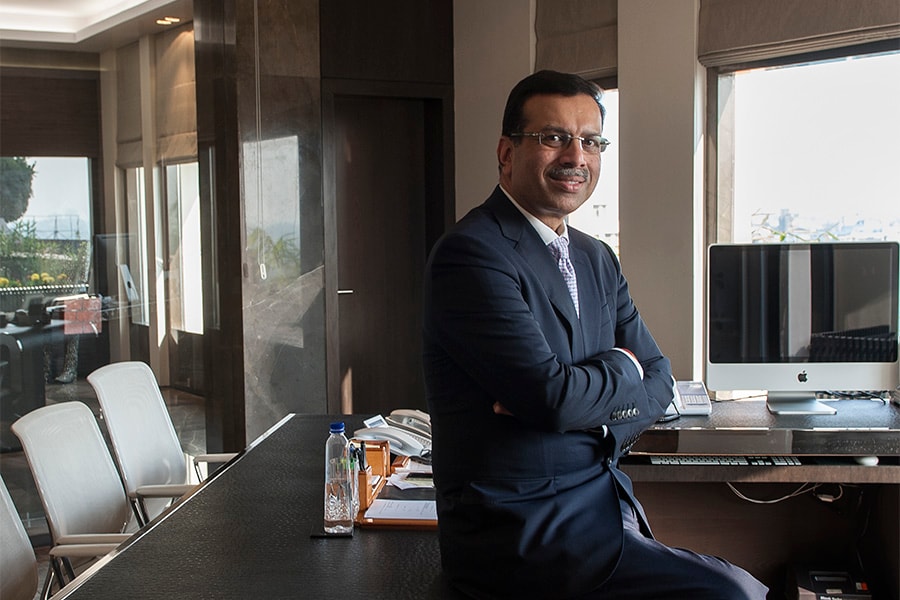
CESC demerger a sign of RP-SG Group's non-power businesses maturing
Analysts expect the sum-of-the-parts valuation of CESC's individual businesses to be over 40 percent higher than the firm's current market capitalisation, signaling prospects of significant value accretion post-demerger
 Sanjiv Goenka
Sanjiv GoenkaImage: Vikas Khot
Despite the sharp decline in the stock price of CESC, the flagship firm of the$2.6 billion RP-Sanjiv Goenka (RP-SG) Group, following the announcement of a major restructuring of the conglomerate’s businesses, analysts believe the structural rejig will be value accretive for shareholders.
RP-SG Group chairman Sanjiv Goenka himself believes that the restructuring was a natural outcome of his business house’s various businesses (especially the newer ones) coming of age, with the ability to stand on their own feet and grow on the strength of their respective balance sheets.
On May 18, at a board meeting called to approve CESC’s fourth quarter and fiscal 2017 earnings, the company’s directors also ratified the proposed restructuring that will see the conglomerate’s businesses, held through CESC, including power generation, retail, information technology and real estate (including mall development) get demerged into three separate entities that are proposed to be listed on the bourses. CESC itself will retain the sole business of power distribution in Kolkata, Noida, and three cities in Rajasthan.
The rejig, on which the RP-SG Group was advised by BSR and Associates, Walker Chandiok and Co, and ICICI Securities, will see shareholders get five shares each in the power distribution and generation businesses; six shares in the retail business (Spencer Retail and Music World) and two shares in CESC Ventures (which will hold investments in Firstsource Solutions, Quest Mall in Kolkata, CESC Properties and the new FMCG business), for every 10 shares held in the pre-demerger CESC (as listed on the bourses currently).
Goenka, who was ranked 91 on the Forbes India Rich List 2016 with a personal net worth of $1.6 billion, admits that the separation of balance sheets for different business within the group, that were earlier clubbed under CESC, is a signal of their ability to now stand on their own feet. The RP-SG Group chairman has also stated previously that his conglomerate will look to grow the share of non-regulated businesses like FMCG, retail and IT as a portion of its overall portfolio. Demerging these businesses into separate listed entities will help it attract capital from strategic investors interested in these sectors, as well as focused management bandwidth.
He cites the example of Spencer’s – a chain of departmental stores – that had been incurring losses and had shuttered stores in certain parts of India in a bid to rationalise costs. Goenka says that Spencer’s revenue have grown 12 percent year-on-year in FY2017; and store-level Ebitda (earning before interest, tax, depreciation and amortization) was 19 percent higher in the same period.
“Spencer’s is now debt free and the interest burden is off,” Goenka says. “Launching of the 2Bme brand of apparels has shown significant promise, with higher margins expected to substantially contribute to Spencer’s Ebitda. The apparels division is targeting a revenue of Rs300 crore in the next three to four years.”
Spencer’s will also look to expand its footprint through “limited store addition in profitable geographies,” Goenka added. Similarly, the group’s real estate business (which owns and operates the popular and upmarket Quest Mall in Kolkata) is already generating profits; and the IT vertical will also see “modest margin generation,” with Firstsource’s surplus available for support if needed, he said.
A research report by IIFL Institutional Equities dated May 19 called CESC’s proposed restructuring a “neat and clean demerger” that would “eliminate conglomerate discount and re-rate multiples in each of the businesses.”
IIFL expects CESC’s power business to be a major beneficiary of the restructuring exercise.
“Although the demerger does not lead to earnings accretion, it should lead to significant improvement in valuation multiples for the core power business,” the IIFL report stated. “This is because under earlier structure the power business has funded diversification initiatives, which depressed valuation multiples despite CESC having one of the best operating matrices. Moreover, the business remains vertically integrated, regulated, and has managed to generate free cash flow over the years. Uniquely, while there are several vanilla listed generation companies in India, the restructuring offers an opportunity for shareholders to own a distribution entity in India.”
The domestic brokerage expects CESC’s sum-of-the-parts valuation to be greater by as much as potentially 43 percent than the market capitalization (of Rs10,700 crore) that CESC enjoys at present.
Goenka, who assumed the reins of his business group in 2011, following a bifurcation of business interests between his elder brother Harsh Goenka (who controls listed companies companies like Ceat, Zensar and KEC International) and himself sums up the expected benefits from the demerger by stating that it will lead to “focused management with specific domain applications; unlocking of shareholders’ value by meeting long-term expectations of investors for putting businesses into relatable verticals; and inviting specific long term investors.”
The Street’s reaction to the news of the demerger on May 18, however, was counterintuitive to the benefits it sees from the restructuring. CESC’s share price fell around 15 percent on that day. “Probably it is taking sometime for everyone to appreciate the real merits (of the proposed transaction),” Goenka observed. The stock has since regained some lost ground, but is yet to reach the level of around Rs986 per share, which it touched on the BSE prior to the announcement on May 18. On Tuesday, CESC’s share price was trading at Rs860.90 apiece at 1:39 pm, down 2.59 percent. The S&P BSE Sensex was down 2.60 percent at the same time.
X




